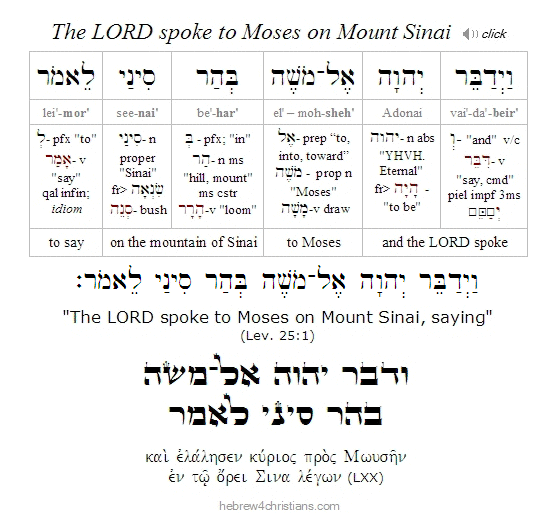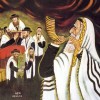|
|
 |
 |
 |
 |
|
Weekly Torah Reading
|
|
|
|
Parashat Behar ("On the mountain")
|
|
|
Click on the links to display the Scriptures:
|
|
|
|
 |
 |
 |
 |
|
Torah Reading Overview
|
|
|
Parashat Behar continues the instruction given to Moses on Mount Sinai (presumably from an earlier time, since there is a chronological gap from last week's parashah).
|
|
|
|
The parashah begins:
|
|
|
|
 |
 |
|
The LORD spoke to Moses on Mount Sinai, saying,
"Speak to the Israelites and tell them, 'When you enter the land that I am giving you, the land must observe a Sabbath to the LORD.'" (Lev. 25:1-2)
|
 |
 |
|
Sabbath for the Land: Shemittah (שְׁמִטָּה)
|
 |
 |
|
In addition to the weekly seventh day of rest (i.e., Shabbat), and the holy convocations on the seventh month (the Days of Awe), every seventh year the land was commanded to rest and remain fallow. This seventh year was called a shemittah (שמיטה), a word that means "to let go" or "to withdraw." The shemittah was a full calendar year in which Jewish farmers were to abstain from all farming in order to let the land rest.
To determine the shemittah year, take the current Jewish year and divide by seven; if there is no remainder, it is a shemittah year; otherwise it is not. For example, if the Jewish year is 5768, you divide by 7 to get 824 with no remainder, so it is a Sabbatical year. The next year (that begins with Rosh Hashanah) is 5769. Divide that by 7 gives 824 with a remainder of 1, indicating one year past the last shemittah. Since the Jewish year begins at Rosh Hashanah, each shemittah begins on Rosh Hashanah (to Yom Kippur) and ends just before the next Rosh Hashanah begins.
|
 |
 |
|
During a shemittah year, no work on the land could be done (i.e., no farming, planting, or other cultivation). Any naturally occurring produce became free for the taking for both man and animals. The produce that grows during this year does not belong to the owner of the land, but is regarded as the LORD's, and therefore anyone who wants to can come a pick some without charge (i.e. the farmer cannot sell the fruit or control access to the land).
|
|
|
 |
 |
|
The shemittah was more than a year of cessation from agricultural labor, however, since all outstanding debts were canceled during this year as well. All loans were forgiven in the shemittah year, and no lender of money could demand repayment from a debtor (see Deut 15:1-4).
According to the sages, the LORD promised Israel that the harvest of the year before the shemittah would be so bountiful that it would last for three full years. In addition, during the shemittah year, everyone would feel satisfied, and the land would dwell safely from Israel's enemies. Finally, it is said that the Mashiach will come at the end of a shemittah year, so those who observe this mitzvah are helping bring him into the world.
The observance of shemittah was a real test of faith, since it meant that the Jews had to completely trust that the LORD would provide for them, despite abandoning their usual farming and banking practices. Sadly, the people did not observe the laws of shemittah, and this eventually lead to the 70 year captivity in Babylon, one year in captivity for each year that shemittah was disregarded (see 2 Chron. 36:20-21). This implies that for (at least) 490 years before the siege of Nebuchadnezzar in 606 B.C., the Jews had failed to keep the shemittah, and the LORD required middah keneged middah ("like for like") punishment: one year of captivity for each year the land was forced to serve.
 |
|
 |
 |
|
The Year of Jubilee: Yovel (יוֹבֵל)
|
 |
 |
|
After seven of these seven-year sabbatical cycles (shemittot) had elapsed, a fiftieth year -- called Yovel (יובל), or the Jubilee year -- would occur, at which time work on the land also would cease (in addition to the shemittah), servants would be set free, and the original tribal inheritances in the land would be restored to their original owners. Just as Shavuot comes on the fiftieth day of Sefirat HaOmer and represents a departure from the natural world into the divine (by reversing the 49 levels of sin the Jewish people had lapsed into while in Egypt), so the Yovel signals an opportunity to rise above nature.
|
 |
 |
|
On Yom Kippur (i.e., יוֹם הַכִּפֻּרִים) of the new year, a shofar blast would be sounded throughout all the land to proclaim the liberty of the Yovel:
"You shall sound the shofar on the tenth day of the seventh month, on the Day of Atonement shall you sound the shofar throughout all your land. And you shall hallow the fiftieth year, and proclaim liberty throughout all the land to all its inhabitants thereof: it shall be a jubilee for you. And you shall return every man to his estate, and you shall return every man to his family." (Lev. 25:8-10)
|
|
|
 |
 |
|
Where does the Yovel year get its name? According to Rashi, from the sounding of the shofar. A ram's horn is called a yovel in Hebrew (Josh 6:4-14).
According to the sages, there will one day be a tremendous shofar blast that will announce the Mashiach to Israel, the true liberator of the Jewish people. As Messianic believers in Yeshua, we understand that the great shofar blast will herald the return of the Lord (1 Thess. 4:16-17) for kallat Mashiach, the Bride of Christ before yom Adonai, the great and terrible Day of the LORD.
Parashah Behar concludes with additional rules about concerning the sale (and redemption) of inherited lands, and lists prohibitions against fraud and usury.
|
 |
 |
 |
 |
 |
 |
 |
 |
|
 |
|
|
|
The Number Seven
|
|
|
|
As an aside, the number seven recurs throughout the Scriptures and Jewish tradition. Here are just a few examples:
- The Torah begins with a verse containing seven words (bereshit bara elohim et hashamayim v'et ha'aretz).
- God rested on the seventh day of creation.
- God ordained Shabbat as a day of rest during a week of seven days.
- There are seven universal laws given to mankind (sheva mizvot bnei noah).
- The seven species of produce with which the land of Israel are blessed are known as shivat ha-minim: wheat, barley, grapes, figs, pomegranate, olives, and dates (Deut. 8:8).
- There are seven ordained mo'edim (holidays) in the Jewish year: Passover, Unleavened Bread, Firstfruits, Shavu'ot, Yom Teru'ah, Yom Kippur, and Sukkot.
- The seventh Month (Tishri) was to be holy (the Jewish New Year of Rosh Hashanah occurs in the seventh month).
- On Yom Kippur, the High Priest sprinkled the blood in the Temple seven times.
- There are seven weeks in the counting of the omer before Shavu'ot.
- In Israel, there are seven days of Passover and Sukkot.
- Every seventh year, the land lays fallow during Shemittah.
- After seven cycles of shemittah, we have a Jubilee year called Yovel.
- The Menorah in the Temple had seven branches.
- There were seven gates to the Temple.
- At a Jewish wedding, seven blessings are recited and the bride circles the groom seven times under the chuppah (wedding canopy). Weddings are followed by seven days of celebration.
- Jewish tradition calls for a seven-day mourning period that starts immediately after the funeral. This period is known as shivah, literally seven.
- Each Shabbat, seven people are called to the Torah reading (aliyot).
- Joshua led the people around the walls of Jericho seven times before the walls fell.
|
|
|
 |
|
|
|
Haftarah Reading Overview
|
|
 |
 |
|
The haftarah portion of Behar concerns the redemption of some land by Jeremiah the prophet, just before the Babylonian army (Kasdim) was poised to strike and destroy Judah. By faith Jeremiah paid the redemption price and performed the transaction before the leaders of Judah in order to attest to the word of the LORD that one day the Jews would return to the land and rebuild it: "There will again be buying of homes and fields and vineyards in this Land," for nothing is too difficult for the LORD God of Israel.
Note: The seventy years of Babylonian captivity were punishment for the seventy shemittot Israel missed from the time they entered the land to the destruction of the first Temple (i.e., 490 years). During the captivity God caused the land to receive its appropriate rest by remaining desolate for seventy years.
|
 |
 |
|
The forgiveness of debts and return of slaves on Yovel is called the "Jubilee Release." The Brit Chadashah portion reveals that Yeshua the Mashiach was sent to set the captives free by releasing them from their slavery to sin. Yeshua read these words during an aliyah He performed at the synagogue:
"The Spirit of the Lord is upon me,
because he has anointed me
to proclaim good news to the poor.
He has sent me to proclaim liberty to the captives
and recovering of sight to the blind,
to set at liberty those who are oppressed,
to proclaim the year of the Lord's favor." (Luke 4:18-19)
Yeshua then stated that "Today this Scripture has been fulfilled in your hearing," indicating that He was the Substance of which the ritual was merely a type.
Blessing:
|
|
|
 |
 |
|
For Further Study:
|
|
|
|
 |
 |
|
Hebrew Audio Files:
|
|
 |
 |
|
Click the following links to hear the desired chapters read from this week's Torah:
|
|








